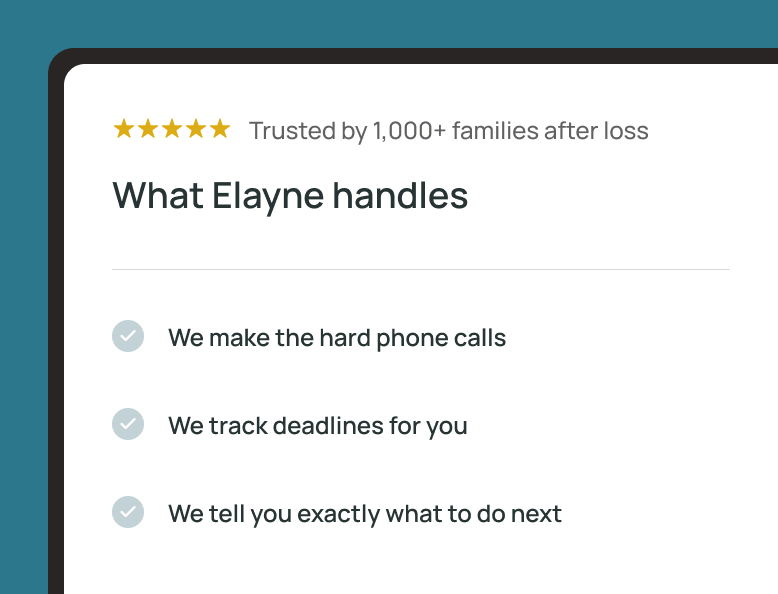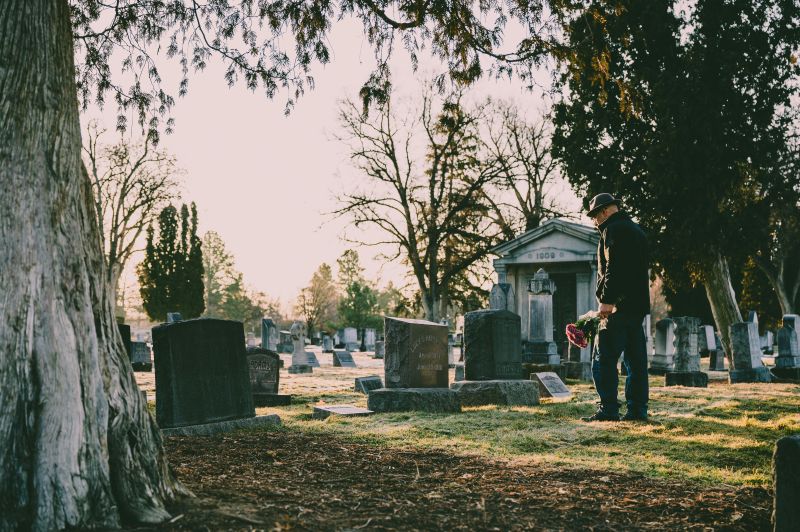Key Takeaways:
- A Power of Attorney (POA) immediately ends upon the person’s death.
- After death, legal authority shifts to the executor or personal representative named in the will.
- POA documents are not valid for managing the deceased’s estate.
Introduction
Power of Attorney (POA) is a legal arrangement that allows one person to act on behalf of another. It’s commonly used when someone is aging, managing an illness, or preparing for a time when they may not be able to make decisions on their own.
However, when POA ends, the transition can feel very abrupt. One day you’re making payments, scheduling appointments, and coordinating care. The next, you're being told by banks, insurers, and service providers that they can’t work with you anymore.
In this article, we’ll walk through the basics of POA, when it ends, and what happens next. We’ll also answer common questions, share best practices, and explain how Elayne can help you navigate this transition and connect with the right legal and financial professionals.
What Is Power of Attorney?
Power of Attorney is a legal document that gives one person (the agent) authority to act on behalf of another (the principal). There are different types of POA, depending on what kind of support is needed:
- A financial POA might allow you to pay bills, manage bank accounts, or handle real estate.
- A medical POA can give you the right to speak with doctors, access health records, and approve treatments.
Some POAs are very specific, while others are broad and long-lasting. However, they all have something in common: they’re only valid while the principal is alive.
What Happens to Power of Attorney After Death?
POA is an agreement between two living people. When the principal dies, POA is no longer recognized, and a new process must begin to manage the principal’s estate. At that point, trying to act as POA can lead to rejected requests, delays, and even legal issues.
Who Has Authority After Death?
When POA ends, someone must be authorized to handle the principal’s affairs. If there’s a valid will, the executor named in that document takes over. The executor is responsible for settling debts, filing taxes, distributing assets, and handling the overall estate process.
If there is no will, a family member or trusted person can apply through the probate court to become the estate’s administrator.
Sometimes, the person who served as POA is also named as the executor or becomes the administrator. However, to continue acting in an official role, you’ll need new documentation, such as court appointment papers or the will naming you as executor.
FAQs
This transition brings up many questions. Here are some of the common:
1. I was POA for my parent. Can I still manage their accounts?
No. POA ends at death. Only someone who has been appointed by the court or named in the will can access and manage those accounts.
2. There’s no will. Who handles everything now?
If there’s no will, a family member or trusted person will need to apply through the court to become the estate’s administrator.
3. Can I keep paying bills from my loved one’s account?
Not unless you’ve been legally authorized. Even small, well-intentioned payments like rent or utilities can create problems if made without proper authority. It’s better to pause, confirm who’s in charge, and then proceed accordingly.
4. I’m still listed on their POA paperwork. Isn’t that enough?
No. Once the person passes, POA documents are no longer valid. You’ll need new legal documents to act on behalf of the estate.
5. My loved one wanted me to be in charge. Why am I not automatically the executor?
Being POA doesn’t automatically make you the executor. To manage your loved one’s estate, you must be appointed by the court or named in the will.
6. Can I use my POA status to close accounts or cancel services?
No. You’ll need documentation proving you are the executor or administrator. Companies typically require a death certificate and legal proof of authority.
7. What if I’m the executor, but I was also POA before?
That’s completely fine. However, remember that your POA authority has ended. You’ll now act as executor and need to present the correct documents when working with banks, courts, and service providers.
8. I’m not the executor, but I was very involved as POA. Can I still help?
Yes. Your experience and knowledge can be extremely helpful. Just make sure to coordinate with the person who holds legal authority.
9. What happens if multiple people think they’re in charge?
The court will ultimately decide. In these situations, it’s best to consult an estate attorney, and seek guidance on how to proceed.
10. What if I already acted after the death, thinking I still had POA?
That’s a common mistake. If you took any actions after the principal died, let the executor or administrator know right away. An attorney can help assess what, if anything, needs to be corrected.
Steps to Take After a Loved One’s Death
If someone you supported as POA has passed, here are some best practices to consider:
- Stop using POA immediately. It’s no longer valid and should not be used in any capacity.
- Keep records organized. Notes, documents, or emails from your time as POA may still be helpful to the person managing the estate.
- Confirm who has legal authority. If it’s not clear, contact the court or consult with an estate attorney.
- Avoid moving or disposing of property. Until authority is confirmed, it’s best to pause action.
- Coordinate with other family members. This helps prevent miscommunication or duplicate efforts.
At Elayne, we make it easy for families during this transition. We can help you understand what’s changing, determine what kind of professional support might be required, and connect you with trusted attorneys, accountants or financial advisors. Whether you need help finding documents, clarifying your role, or figuring out which professional to contact first, we’re here to help.
Conclusion
When someone you love passes away, legal tasks are the last thing you want to think about. But knowing where POA ends and where estate management begins can make a confusing process more manageable. It helps you avoid mistakes, reduces delays, and brings more clarity to a difficult period.
Also, even if you’re not in charge of the estate process, there are still ways to help. You can be a source of information, advocate for your loved one’s wishes, and support the person in charge. The decisions you made as POA were extremely important, and your presence during this next phase can be just as meaningful.
*Disclaimer: This article is for informational purposes only and does not provide legal, medical, financial, or tax advice. Please consult with a licensed professional to address your specific situation.















































